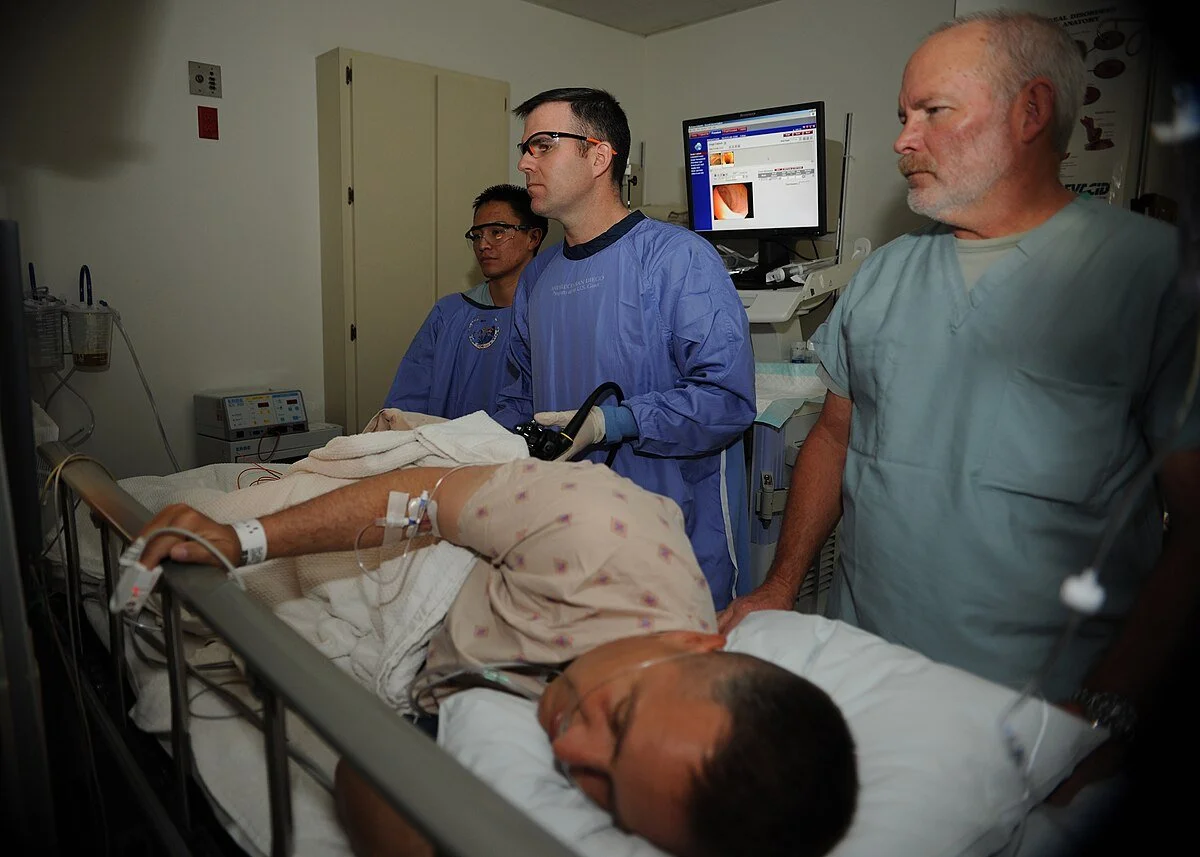Getting a Colonoscopy
It could be your first one, it could be your fourth one, it could be your fifteenth one (I honestly don’t even know how many I’ve had at this point). Getting a scope is a vulnerable experience, can be uncomfortable, trauma inducing, dysphoria inducing, or scary, especially if we don’t know a lot about what happens in the colonoscopy room. Luckily - I have shadowed (watched) a LOOOOOT of colonoscopies, EGDs, G-POEMs, and other scope stuff - and have had scopes myself - and I’m here to give you the 4-1-1 on what goes down!
Because of disparities in care, LGBTQ+ individuals have lower rates of colorectal cancer screening (via colonoscopy) and colonoscopy access. Screening colonoscopies can help IBD, detect, and prevent colon cancer - so it’s important to get scoped!
I don’t have the license to perform a colonoscopy, but I have been on both sides (watched plenty, had plenty) and I can attest to the experiences.
Getting a Colonoscopy: Leading Up To
-
First: I'M PROUD OF YOU!!
It is very brave and important to take care of your gut health by getting a colonoscopy - they can seem daunting and intimidating by the prep you have to do and it can be a very anxiety inducing experience for many. I am proud of you for being brave and scheduling your colonoscopy.
-
Prep Time!
*This all depends on the type of prep your doctor ordered, but for a lot of people, the general rules are the same. No popcorn, granola, etc (generally… ask your GI nurse or doctors office!) But overall: follow your guidelines you got from your doctors office.
*FUN FACT: a clear liquid is actually a clear liquid in the bowel, not one that you can see with your eyes! So things like black coffee (with no creamer ) counts as a clear liquid, Coca-Cola, Diet Coke, Pepsi, Root Beer, Sprite, gummy bears, (stay away from red) and Italian ice are all things that “count” as things you may be able to have. People on IBD/IBS groups come up with really creative ways to still have a little enjoyment with their prep - obviously double check with your doctor too.
* There are several different types of colonoscopy preps, and your insurance (ugh) may “decide'“ which one for you, but (and you didn’t hear this from me), I pay for my prescription prep with a manufacturers coupon so it is cheaper ($40).
* PEG-based (polyethylene glycol 3350) colonoscopy prep drinks
- GoLytely, CoLyte, NuLytely, TriLyte, HalfLytely, GaviLyte, Moviprep, Miralax
Saline-based formulas (NaP)
- (the ones I use, my personal favorite since it’s easier and more convenient for me)
*Clenpiq, SuPrep, SuTab, Prepopik, Visicol, SuTab (what I use), OsmoPrep
-
Wet Wipes, Bidet, Creams, Lotions
Trust Me.
*Don’t waste money on Dude Wipes. Those are overpriced.
*Baby wipes are the best wet-wipes to use, hypoallergenic/water based ones are good please don’t use witch hazel preparation-H wipes when doing colonoscopy prep you will be hurting). Look for “Sensitive” and water-based on the Pampers or Huggies wipes.
*If you can’t get the water based ones, the regular Huggies or Pampers (or the store brand is just fine) are fine, unscented preferably.
*The scents (the things they add to make it scented) can be irritating and leave your butt sore.
* I have been advised that there is "No such thing as a flushable wipe” (even if it says so), but…. you gotta do what you gotta do.
*For creams, I may be biased on the brands/products, but I HIGHLY RECOMEND:
* Coloplast Moisture Barrier Cream, For Skin Irritation Due to Incontinence
*Coloplast Critic-Aid Moisture Barrier Ointment, Clear
*Coloplast Brava Barrier Cream, 60mg
*3M™ Cavilon™ Durable Barrier Cream
*Some people also like Boudreaux's Butt Paste Diaper Rash Ointment Maximum Strength - I have never used it!
* You can get a bidet attachment for your toilet too (no more TP) - once you get one, you really never look back.
How do providers incorporate trauma informed care?
Trauma informed care in gastroenterology and the endoscopy/colonoscopy suite can be very important for LGBTQ+ individuals, particularly if you have a history of negative experiences with healthcare, a history of trauma or abuse, are anxious, and overall is a good practice.
Safe and Welcoming Environments In the Colonoscopy Suite
They will ask for your consent before any exam or procedure.
You can pause or stop at any time.
They will explain each step clearly, including during colonoscopies and rectal exams.
You can bring a support person or chaperone if that helps make you more comfortable,chosen family, friends, a partner, whoever brings you comfort.
Your pronouns, name, and identity will be respected, and if they aren’t, you don’t have to continue seeking care there.
They will ask about your comfort and trauma history only if you want to share, you don’t have to share anything if you are not comfortable doing so.
They will debrief post-procedure and let you know everything.
You are in control!
You can say things like:
“Can you explain what’s happening next?”
“I’d like to skip that part today.”
“I’m feeling anxious, can we slow down?”
“Please use (———) pronouns.”
“Can I bring a friend/partner for support?”
This is your body and you are in control - you have all of the right in the world to:
Be heard.
Be respected.
Ask for what you need.
Pause or stop at any time.
The Day Of
-
Arrival
*When you arrive to your appointment, you will check in at admissions or front desk (every place has a different system, where I go, I check in at admissions, fill out some papers, get a bracelet, and sit and wait to be called back).
* In most cases you will have to arrange for someone to accompany you home the day of your procedure - it may be helpful to confirm if a healthcare facility is okay with letting chosen family (i.e, people that are not your blood relatives, but care for you just as much) transport you, as some must have it be a legal guardian or spouse.
-
Going Back
* When you do get called back, you will get a hospital gown, some socks, and a bed, an they will ask you to change into a gown.
* A member of your care team will place an I.V., which will be used to administer a sedating medication during the procedure.
*You will speak with both the gastroenterologist and someone from the anesthesia team (anesthesiologist, CRNA, etc) prior to the procedure to explain the procedure to you once more, explain any risks involved, and answer any final questions you may have, get your signatures for consent and have you read some papers and go over your past medical history (for example, history of IBD, history of seizures, heart conditions, etc).
* They are asking all of these questions to make sure they can take care of you the best way they can and give you the best colonoscopy (or EGD or whatever you are having) AND best anesthesia care!
* They will likely ask if you have smoked or used THC or marijuana products - this is NOT TO GET YOU IN TROUBLE!!! This is because using THC or marijuana/weed/edibles/whatever you use can make the rate at which you metabolize the anesthesia different, so they need to give you more so you don’t wake up in the middle of the scope.
* Some providers are specially trained in trauma-informed care, and particularly trauma-informed endoscopy/colonoscopy, and this may be something to look for if that is something you think would help you.
*You do not need to be out to receive respectful car. They won’t assume anything about your anatomy or label your body - they are there purely to take care of you and your digestive system.
* If you bind or tuck, you can ask for private space to undress/change - 99.999% of the time, you will have a private room to change in (I have literally never not had a private bathroom where I changed in)
-
During The Scope
* You made it to the great nap!
* I know it may be really uncomfortable, vulnerable, and scary - trust me - I get it. I trust my GI doctor and he’s the bestest, but I wouldn’t be comfortable with just anyone doing any kind of scope on me. I wouldn’t be as comfortable if I didn’t have a provider I trusted, and I don’t have follow ups or procedures with providers if I feel really uncomfortable or really weirded out. (for lack of a better term)
* During the scope, the GI doctor and the colonoscopy techs may reposition your body so the scope can get where it needs to go(it’s a tiny camera attached to a loooong skinny flexible tube thing), but your body is completely covered.
* Not only are your body and private areas completely covered, but the doctors are going to be looking at the screen (showing the pictures from your colon/stomach/where the scope is) anyway)!
* I know this may not help a lot, particularly if you have bottom dysphoria or a history of negative experiences or trauma surrounding the area, but I promise you, their goal is focusing on getting your colon better - you are COMPLETELY COVERED (I have shadowed many scopes)
-
After the Scope
* Depending on what your provider uses, when you wake up, you may feel a tiny bit of moisture or lube on your anus/butt. This is from the lubricant they put on the scope, and sometimes it isn’t wiped up completely. (if you aren’t expecting that, it can kind of throw you off, but it is just from the scope)
* Drink fluids and eat gentle, soft foods until your stomach settles.
* Avoid binding or tucking immediately after if you feel sore or swollen (you’ll be bloated from the air they use in the scope)
* Rest!!
* Your provider will debrief with you and ask you if you have questions, how you are feeling, and check on you. Nursing staff will also check on you.
* It’s completely valid to feel scared, anxious, upset or any kind of emotion. Colonoscopy involves exposure, sedation, and loss of control, all of which can resurface trauma, especially for survivors of sexual assault, medical abuse, or anti-LGBTQ+ discrimination.
* You just did something very brave and important too by getting your colonoscopy! Colonoscopy is vulnerable, physically and emotionally. Whether you were sedated or awake, you deserve compassion and space to recover on your terms.
When you are ready, you can ask your provider:
“Could you go over the findings with me in simple terms?”
“Can I have a private space for the follow-up conversation?”
“Can I get a printed copy or online message of my results?”
“Can I schedule a follow-up to talk more when I’ve had time to process?”
It’s kind of hard to find a picture showing it, but you can see it here sort of - you are covered, and they are looking at the screen showing your colon (or where the scope is)


